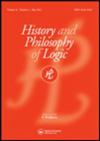黑格尔连接、黑格尔矛盾
IF 0.5
3区 哲学
Q3 HISTORY & PHILOSOPHY OF SCIENCE
引用次数: 2
摘要
理解黑格尔观点的严格形式意义是什么,是很少有分析哲学家认为值得花费时间的事情。尽管如此,在我们看来,黑格尔的著作中有足够的内容表明,对其辩证过程的正式描述可能有助于更好地理解黑格尔的思想,也有助于引入一种新的贪婪逻辑。我们分析的重点是黑格尔的连词,在我们看来,它是至关重要的辩证操作,其他一切最终都是基于它。本文章由计算机程序翻译,如有差异,请以英文原文为准。
Hegelian Conjunction, Hegelian Contradiction
Understanding what is the strictly formal import of Hegel's view is something on which few analytic philosophers have seen time worth spending. Still in our view there is enough in Hegel's work to suggest that a formal account of his dialectial process might be profitable both for better understanding Hegel's ideas and for introducing a new sort of glutty logic. The focus of our analysis is Hegel's Conjunction, which, in our view, is the crucial dialectical operation, on which all others are ultimately based.
求助全文
通过发布文献求助,成功后即可免费获取论文全文。
去求助
来源期刊

History and Philosophy of Logic
综合性期刊-科学史与科学哲学
CiteScore
0.80
自引率
0.00%
发文量
24
审稿时长
>12 weeks
期刊介绍:
History and Philosophy of Logic contains articles, notes and book reviews dealing with the history and philosophy of logic. ’Logic’ is understood to be any volume of knowledge which was regarded as logic at the time in question. ’History’ refers back to ancient times and also to work in this century; however, the Editor will not accept articles, including review articles, on very recent work on a topic. ’Philosophy’ refers to broad and general questions: specialist articles which are now classed as ’philosophical logic’ will not be published.
The Editor will consider articles on the relationship between logic and other branches of knowledge, but the component of logic must be substantial. Topics with no temporal specification are to be interpreted both historically and philosophically. Each topic includes its own metalogic where appropriate.
 求助内容:
求助内容: 应助结果提醒方式:
应助结果提醒方式:


